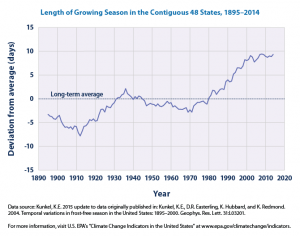The recent warming across the Southeast has caused pollen counts to soar. In Athens where I live, it seems to me like the usual progression of flowers and their pollen have compressed into one short burst of blooming as temperatures of over 80 F have occurred in many parts of the region, even with cold spells on some nights. A lack of rainfall has also helped keep pollen in the air instead of washing it out.
Online Athens reported that “Atlanta Allergy & Asthma tracks pollen in the Atlanta area, and its gauge hit the red zone this weekend — 2,890 grains of pollen per cubic meter of air on Saturday, 2,651 on Sunday. Pollen didn’t get high until the first week of April last year.” However, they note that pollen counts are not at record levels; that occurred on March 20, 2012. You can read the report here.
The National Environmental Education Foundation (NEEF) also published an article this week noting that many plants and trees are blooming earlier than they did over the past century due to milder winters and earlier spring thaws. They also note that in combination with later fall seasons, the length of the growing season in the contiguous 48 states has increased by nearly two weeks since the beginning of the 20th century.

